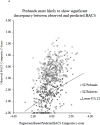Deviation from expected cognitive ability across psychotic disorders
- PMID: 28545944
- PMCID: PMC5699979
- DOI: 10.1016/j.schres.2017.05.019
Deviation from expected cognitive ability across psychotic disorders
Abstract
Patients with schizophrenia show a deficit in cognitive ability compared to estimated premorbid and familial intellectual abilities. However, the degree to which this pattern holds across psychotic disorders and is familial is unclear. The present study examined deviation from expected cognitive level in schizophrenia, schizoaffective disorder, and psychotic bipolar disorder probands and their first-degree relatives. Using a norm-based regression approach, parental education and WRAT-IV Reading scores (both significant predictors of cognitive level in the healthy control group) were used to predict global neuropsychological function as measured by the composite score from the Brief Assessment of Cognition in Schizophrenia (BACS) test in probands and relatives. When compared to healthy control group, psychotic probands showed a significant gap between observed and predicted BACS composite scores and a greater likelihood of robust cognitive decline. This effect was not seen in unaffected relatives. While BACS and WRAT-IV Reading scores were themselves highly familial, the decline in cognitive function from expectation had lower estimates of familiality. Thus, illness-related factors such as epigenetic, treatment, or pathophysiological factors may be important causes of illness related decline in cognitive abilities across psychotic disorders. This is consistent with the markedly greater level of cognitive impairment seen in affected individuals compared to their unaffected family members.
Keywords: Brief assessment of cognition in schizophrenia; Cognitive decline; First-degree relatives; Premorbid cognition; Psychotic disorders.
Copyright © 2017 Elsevier B.V. All rights reserved.
Conflict of interest statement
Conflicts & Disclosures
The other authors have no disclosers at this time.
Figures






References
-
- Bilder RM, Goldman RS, Robinson D, Reiter G, Bell L, Bates JA, Pappadopulos E, Willson DF, Alvir JM, Woerner MG, Geisler S, Kane JM, Lieberman JA. Neuropsychology of first-episode schizophrenia: initial characterization and clinical correlates. Am J Psychiatry. 2000;157:549–559. - PubMed
-
- Birchwood M, Smith J, Cochrane R, Wetton S, Copestake S. The Social Functioning Scale. The development and validation of a new scale of social adjustment for use in family intervention programmes with schizophrenic patients. Br J Psychiatry. 1990;157:853–9. 853–859. - PubMed
-
- Bishop JR, Reilly JL, Harris MS, Patel SR, Kittles R, Badner JA, Prasad KM, Nimgaonkar VL, Keshavan MS, Sweeney JA. Pharmacogenetic associations of the type-3 metabotropic glutamate receptor (GRM3) gene with working memory and clinical symptom response to antipsychotics in first-episode schizophrenia. Psychopharmacology (Berl) 2015;232:145–154. - PMC - PubMed
-
- Blokland GA, Mesholam-Gately RI, Toulopoulou T, Del Re EC, Lam M, DeLisi LE, Donohoe G, Walters JT, Seidman LJ, Petryshen TL. Heritability of Neuropsychological Measures in Schizophrenia and Nonpsychiatric Populations: A Systematic Review and Meta-analysis. Schizophr Bull. 2016:sbw146. - PMC - PubMed
-
- Bouchard TJ. Genetic incluence on human psychological traits: A survey. Current Directions in Psychological Science. 2004;13:148–151.
Publication types
MeSH terms
Grants and funding
LinkOut - more resources
Full Text Sources
Other Literature Sources
Medical
Miscellaneous

